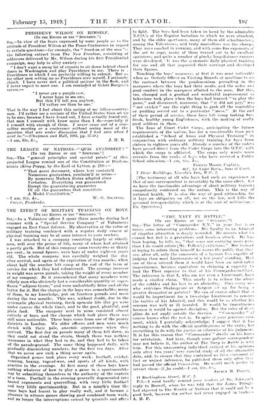" NAVY IN RATITE."
(To TOO EDITOn or THE SrITTATON.”)
Sue.—The letter of " Connuansler R.N." in your 1:I•1 raises some interesting problems. His loyally to mi Adolicd of singular attraction is steeply wounded. lfe resents nhnt cannot but feel is a graluitons and baseless attack. Ile 113 been hoping, he tells us. "that some one carrying mere pm, then I du would refute IMr. Pollen's] eritkiA/I.." Ma instead of trying to refute them himself be warns the public that Ilia are, after all, only the comments of a layman less expeble of judging than most Lieutenants of a few years' blending. 11,1 one of these uttered them it would have been nu intokralt'n impertinence, because equivalent 10 he indng a copecily Io lead the Fleet superior to that of his Commander-in-Chief. The inference is that I, who ant not even a Lieutenant, hare ntado a similar chains. 'Ibis surely is to roluee the adage of the cobbler and his last to an absurdity. Does every on. who criticizes Shakespeare or Sargent set lip for Iseing greater dramatist or painter? We can of course admit that it would be impertinent for a two-stripe Lieuttmant to censor,' the tactics of his Admiral, end this would be s. whether hit Censure was well or ill founded. It would be impertinenee because it would be against discipline. But the miles of ai,i.
plies do not apply outside the Service. " Commander " of course knows what the test is. In spite of your generous com- ment, which I gratefully acknowledge, I suggest hint it has nothing to do with the official qualifications of the critic, but everything to do with the jostler or otherwise of his judgment. It is for this reason that "Comnmnder '• dwells on his bole's for refutation. And here. 111011E11 your gallant correspenden1 may not believe it, the anther of The Nary in SOU" is wills him. Far this unassuming individual arrived at his opin. only niter two years' very careful study of ell the obtainable slate, and, to ensure that they contained no ld,e base b•unenl of fact or unjust inference, be published them only offer they bad passed the °Mein) evil•ormIlip. He would Midi prefer II
retract them—if could.-1 see, Sir, 4e..
Acres It. reurv.
if Huckioghom Street, 11'.r. 2. P.S.—I need harshly remind your Moir, of Dr. Johninn's reply to Boswell, whine he was tart that time .lames rringhl had objected to The Wealth of Notions that it could not he n good book, because the nether had never engaged in trail,— A. H. P.


































 Previous page
Previous page